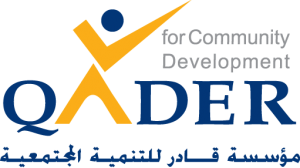Around one in five women worldwide is a woman with disability. For women with disability, gender-based violence and disability discrimination intersect to create brutal barriers to well-being.
Violence against women and girls with disabilities in Palestine includes sexual violence, verbal violence, psychological violence, economic violence, and violence within institutions. In addition, violence against women and girls with disabilities includes forced isolation or detention, sterilization,* forced psychological interventions, medical exploitation, drug withholding or forced use, privacy violation, deprivation of liberty and freedom, denial of their right to care, denial of basic-need materials, and humiliation. Moreover, women and girls with disabilities are often forced to stay in boarding houses, being denied their right to make decisions regarding their own lives − including matters relating to their bodies − and depriving them of the resources they may have, whether financial or otherwise. Eventually, they face social, economic, and political exclusion and dependence which inevitably leads to limited participation in society, limited employment opportunities, and limited communication with others.
It crucial to emphasize that violence based on gender and disability is an intersection between gender and disability. Women with disabilities therefore are exposed to multiple vulnerabilities, namely, to males on the one hand and to women without disabilities on the other. They are at higher risk due to several factors, including social isolation, stigma, unequal power relations, and inaccessibility of services. Many authors in the relevant literature suggest that violence against women and girls with disabilities is more acute and widespread and occurs over longer periods of time and with worse physical and mental outcomes than violence against women and girls without disabilities. They are exposed to all forms of violence that are directly related to their low social status, to cultural determinants that characterize them as being less valuable, and to their increased dependence on others.
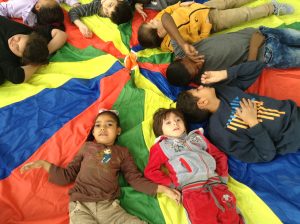
In Palestine, unfortunately, too many existing programs meant to prevent gender-based violence do not take into account the unique dangers and challenges faced by women with disabilities. Without specific attention and solutions, these women have been left behind and at risk.
We have to do it! We must enhance change! We must challenge existing barriers!
Palestinian civil society organizations consider the reduction of gender-based violence to be a mutual responsibility among all stakeholders and believe in the continuous partnership between accountable power holders − such as civil society organizations, official institutions, development agencies, and service providers − who must build into their programs successful models of protection for women and girls with disabilities. Potential interventions need to be mindful of the complex intersection between gender and disability bias. There is evidence that there are different strands of violence − some of which are clearly based on gender, others on disability, and others on a complex interplay between the two. This intersection needs to be explored in more depth through various research methods; it will require sustained national focus, momentum, and action. Society’s belief in “leave no one behind” must be serious and expressed in its theory of change and in the models, strategies, and programs it adopts.

There are four pillars that can guide Palestine’s continuation on the track of protecting the rights of women and girls with disabilities and its efforts to challenge and remove existing barriers. First, we need to apply research best practices to document and give evidence of the scale of the problem and how disability and gender intersect − involving women with disabilities in conducting research as they have insight into issues that affect their own lives. Second, we must support the empowerment of women and girls with disabilities; they must be involved in decision-making processes and enabled to become leaders themselves. Awareness must be created to reduce negative attitudes and stigma towards them, so as to reduce risks of violence, which includes the need for adequate measures of protection. Third, responding to multiple actors, our theory of change should include attempts to consider potential interventions of multiple groups of people who abuse women and girls with disabilities. We must understand the relation between them, the role of female family members, men, and boys and find ways to influence the power imbalances between them towards enhancing protection of girls and women with disabilities. Finally, due to the complexity of the various groups of people who are exposed to abuse − among the family, community, and institutions − we need to mobilize allies and shift the responsibility of protection and well-being of girls and women with disabilities to make it a collective concern and cause for action.
Discrimination on the basis of disability is defined as any exclusion, marginalization, or restriction on the basis of functional, sensory, motor, mental, or psychological differences. The combatting of discrimination that aims to negate, nullify, or limit the recognition, enjoyment, and full and effective exercise of fundamental rights and freedoms in all civil, social, economic, political, cultural, and other fields requires that reasonable accommodating arrangements and additional measures and adjustments be provided for individuals with disabilities.
QADER for Community Development is a Palestinian nongovernmental, nonprofit, independent organization dedicated to promoting the well-being of persons with disabilities in Palestine. Since its founding in 2008, QADER has assumed its functional responsibility by addressing the disability issue from a human rights perspective and has adopted a rights-based approach in tackling the various issues that affect persons with disabilities. Relevant publications regarding this theme include The Comprehensive Policies and Procedures Manual for the Protection of Women and Girls with Disabilities from Violence in Palestine, published in 2019 and authored by Shatha Abu Srour, a woman with visual disability.
QADER has worked in various fields and aims to develop the rights of and services provided for persons with disabilities in general. The organization focuses on promoting the establishment of basic standards and methods that are closer to the holistic, legal, and developmental perspective of disability; it aims to ensure that these perspectives are institutionalized at the policy and operational levels in all service sectors.
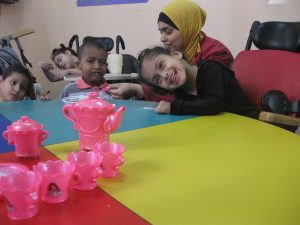
One of the most important methods adopted by QADER’s work is to monitor the reality related to a particular service sector and to identify its strengths and weaknesses and then to provide theoretical or practical alternatives that can be adopted to improve policies, procedures, and interventions. The alternatives can be implemented in a manner that takes into account the privacy of individuals as well as the individual differences that are specifically implicated with various forms of disabilities in terms of sensory, motor, mental, or psychological functions. Thus, the specificity imposed by disability as a concept and experience will be dealt with by any service sector that must respond to these differences simply as a form of human diversity and a variation in human nature.
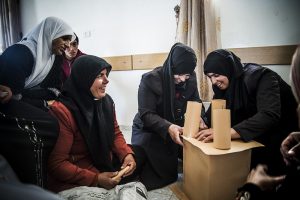
A study on disability and gender-based violence in the West Bank, conducted in 2018−2019 by QADER for Community Development, identified several gaps that hinder the delivery of protection services for women and women with disabilities. Legal and structural barriers are manifest in several forms. For example, the reconciliation committees formed by the specialized court usually place women back into the environment where they were subjected to violence, especially women and girls with mental disabilities. In addition, the national referral system for victims of violence is not inclusive and does not take women with disabilities into consideration. When the system was established, feedback and notes provided by the organizations that engage with women with disability were not included. It is therefore irresponsive to the specificities, definitions, and forms of disability and gender-based violence; moreover, it disregards or lacks the regulatory framework for organizing and regulating the roles of the various organizations that protect women in general and women with disabilities in particular. This situation, in effect, forces these organizations to discontinue their delivery of protection services at certain stages, including legal protection. Consequently, these women and the service-delivery organizations face obstacles that hamper their access to both accurate information and protection services.
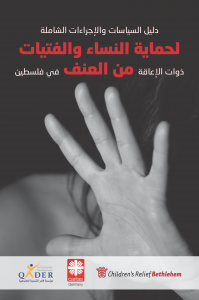
Furthermore, there are socio-cultural challenges that women in general and women with disabilities in particular are facing. These are highlighted by the patriarchal nature of Palestinian society. Women tend to be returned to the place where they had been subjected to violence in coordination with the head of the household who must ensure that these women will not be subjected to violence. In most cases, no legal guarantees are made and no actions are taken against those who subjected the women to violence. Hence, women and girls with disabilities who are victims of violence normally go back to their families without the minimum requirements and guarantees for protection or follow up, which leads to more and augmented violence against them than before they sought protection.
Whatever the nature of the sensory, motor, mental, or psychological differences of women and girls with disabilities, it is totally unacceptable that these differences become grounds for denying them the right to decide their fate and make decisions about their lives. In line with this basic principle, the policies and procedures that govern protection programs and services must include the necessary ingredients for translating this right into reality, as long as it promotes the best interests of women and girls with disabilities.
Another challenge and barrier is the prevailing lack of rehabilitation services at the organizations that provide protection services for these women. The scarcity of financial and human resources for protection interventions at these organizations further increases the gaps in service delivery. Nonetheless, despite the absence of monitoring and follow-up mechanisms for victims of violence, the study showed that all women and girls with disabilities who had previously been subjected to sexual violence had been provided with some form of protection services by the Palestinian Ministry of Social Development, and safe homes had been identified by mere chance and not via set channels and mechanisms that follow up on the living conditions of these women. Finally, these women, irrespective of their disabilities, lack access to protection organizations because little to no information about these organizations and the services they provide is available. This constitutes a major challenge and barrier for these women to exercise their right to protection.
* Girls and women with intellectual disabilities are subjected to hysterectomies as they are more exposed to sexual violence (rape) and thus more at risk of becoming pregnant. QADER advocates stopping this action because the institution believes that this practice implicitly legalizes the violence against these women.
Thanks go to researcher Shatha Abu Srour for her assistance in preparing the material for this article.
Article photos courtesy of QADER.


